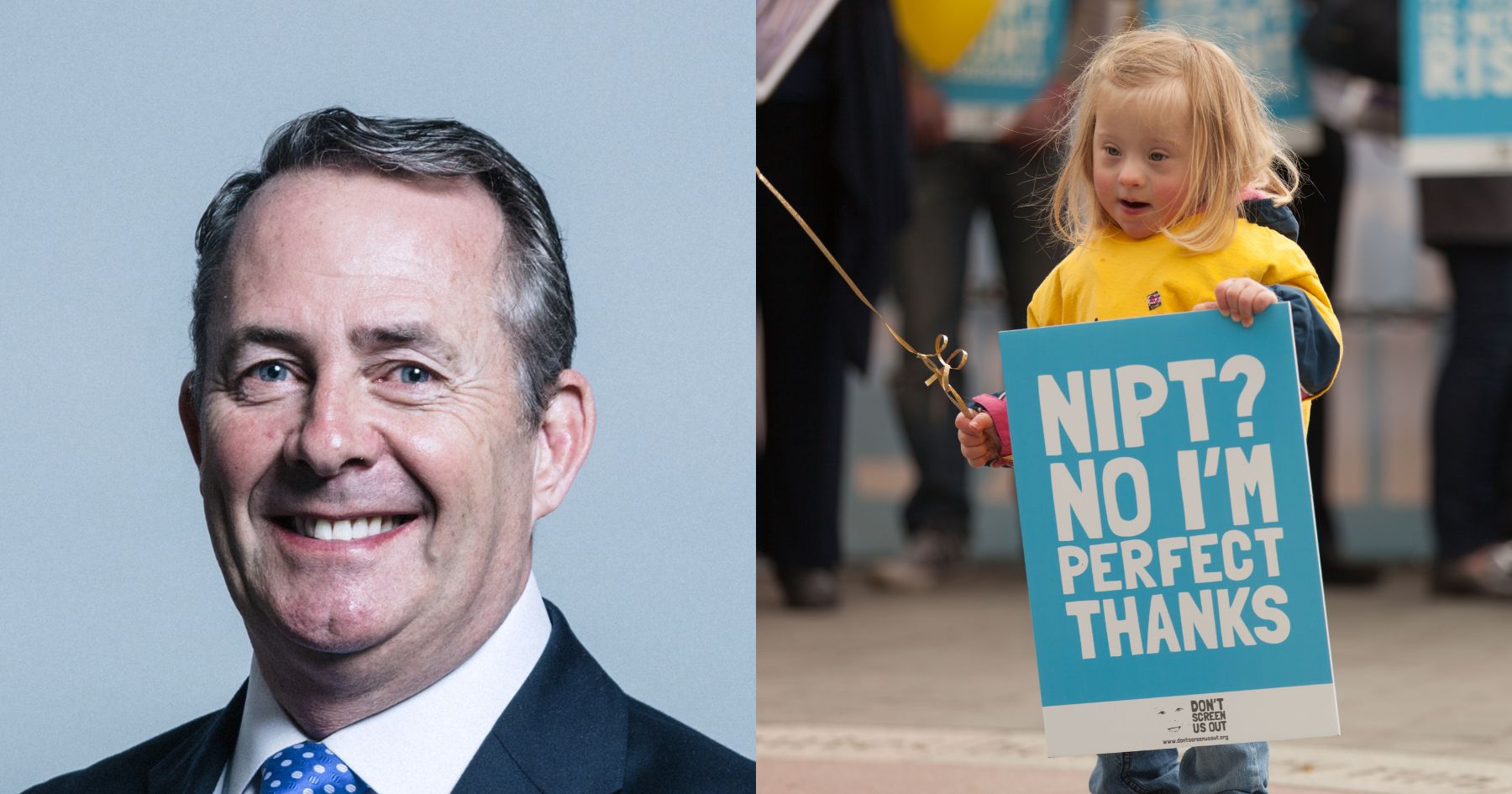Press release for immediate release
Sir Liam Fox MP tables amendment to stop abortion up to birth for babies with Down’s syndrome
Sir Liam Fox, former GP, cabinet minister and defence secretary, has tabled an amendment to the Government’s Criminal Justice Bill, signed by 40 MPs, which will bring the abortion time limit for babies with Down’s syndrome in line with the time limit for babies that do not have disabilities.
The abortion time limit under Section 1(1)(a) of the Abortion Act is set at 24 weeks, but for cases in which a baby is thought to have a disability, including Down’s syndrome, abortion is currently available up to birth. This amendment will equalise the time limit for babies with Down’s syndrome, meaning that it will be set at 24 weeks.
The amendment has cross-party support from MPs from the Conservatives, Labour, Liberal Democrats, SNP and the DUP. This includes former Conservative Party leader and cabinet minister, Sir Iain Duncan Smith, former Liberal Democrat leader Tim Farron, former shadow Chancellor of the Exchequer John McDonnell, former cabinet minister Sir David Davis and former health minister Maggie Throup.
Fox’s amendment will be debated and voted on as part of the Criminal Justice Bill, which is expected to return to the Commons for Report Stage following the Easter recess, which ends on 15 April.
The most recent full-year abortion statistics, for the year ending 31 December 2021, show there were 859 abortions where a baby had Down’s syndrome in 2021, an increase of 24% from 2020.
The actual numbers are probably higher than reported due to underreporting of disability abortion statistics. A 2013 review showed 886 abortions for Down’s syndrome in England and Wales in 2010 but only 482 were reported in abortion statistics from the Department of Health and Social Care. The underreporting was confirmed by a 2014 Department of Health and Social Care review.
There has been growing momentum for a change in the law in this area after Heidi Crowter, a 28-year-old woman from Coventry who has Down’s syndrome, took a landmark case against the UK Government over the disability clause in the current law. Her case has been heard in the High Court and Court of Appeal.
Heidi has been joined in her fight for justice by Máire Lea-Wilson from Brentford, West London, whose four-year-old son, Aidan, has Down’s syndrome. Máire Lea-Wilson was placed under pressure to have an abortion when a 34-week scan revealed her son had Down’s syndrome. There has been widespread coverage of Heidi and Máire’s case across major media outlets.
The UN Committee on the Rights of Persons with Disabilities has consistently criticised countries that provide for abortion in a way that distinguishes between fetuses on the basis of disability.
The Committee on the Rights of Persons with Disabilities’ concluding observations on the initial report of the United Kingdom of Great Britain and Northern Ireland made a key recommendation that the UK change its abortion law so that it does not single out babies with disabilities. The Government has decided to ignore this recommendation.
The Disability Rights Commission (now the Equality and Human Rights Commission) has said that this aspect of the Abortion Act “is offensive to many people; it reinforces negative stereotypes of disability…[and] is incompatible with valuing disability and non-disability equally.”
The 2013 Parliamentary Inquiry into Abortion for Disability found the vast majority of those who gave evidence believed allowing abortion up to birth on the grounds of disability is discriminatory, contrary to the spirit of the Equality Act 2010 and that it affects wider public attitudes towards discrimination. The Inquiry recommended Parliament review the question of allowing abortion on the grounds of disability and should consider repealing section 1(1)(d) of the Abortion Act which allows for it.
Disabled peer Lord Shinkwin previously proposed a Bill in the House of Lords that would have repealed section 1(1)(d) of the Abortion Act – the Bill was undefeated but unfortunately ran out of time. The Bill was supported by Disability Rights UK.
Polling has shown that the majority of people in England, Wales and Scotland feel that disability should not be grounds for abortion at all, with only one in three people thinking it is acceptable to ban abortion for gender or race but allow it for disability.
Sir Liam Fox said:
“There is considerable cross-party support to remove an anomaly in UK law which allows those with Down’s syndrome to be aborted up until 40 weeks. Many of us believe this is utterly against the purpose of our equality legislation and treats those with Down’s syndrome as second-class citizens when it comes to their rights.”
“My amendment would remove an anomaly which many were not aware even existed and send a signal about the values that we share across the political system in our country.”
Lynn Murray, spokesperson for Don’t Screen Us Out and mother of Rachel who has Down’s syndrome, said:
“This is an important change to the law and it’s fantastic to see so many MPs are getting behind this change. Very few people are aware of this discriminatory part of our law that singles out babies with disabilities including Down’s syndrome allowing them to be screened out by abortion up to birth.”
“As a mother of a 24-year-old daughter who has Down’s syndrome, I see every day the unique value she brings to our family and the positive impact she has on others around her.”
“By having a different time limit for babies with disabilities including Down’s syndrome, section 1(1)(d) of the Abortion Act, promotes inequality and perpetuates negative stereotypes. This law sends a message that people with Down’s syndrome are less worthy of life and protection than others.”
“The provision in the Abortion Act harks back to a time when we thought it was better for people with disabilities not to be part of our society. We live in a far more inclusive and progressive society now, where we celebrate diversity, and all of our laws should reflect that.”
ENDS
- Don’t Screen Us Out is a group of over 17,000 people with Down’s syndrome, their families and supporters who are actively working to build a United Kingdom (UK) where people with Down’s syndrome are equally valued and have an equal chance of being born.
- For more information on the Don’t Screen Us Out campaign, see our website www.dontscreenusout.org or email info@dontscreenusout.org
- For interviews, contact Don’t Screen Us Out spokesperson Lynn Murray on 0784 0966 736 or email info@dontscreenusout.org
- Photos and videos of Heidi and other people with Down’s syndrome holding rallies to support the case that are available to be freely used by media are here:
- Previous news coverage featuring Heidi Crowter:
- Recordings of media interviews on the BBC, ITV, Sky etc are available here: https://youtube.com/playlist?list=PLG6Sw7kMnaLXUop-qCQP72ZEMLZ6YghZY
- Telegraph – https://www.telegraph.co.uk/news/2020/10/18/woman-downs-syndrome-says-better-dead-eyes-law-ahead-legal-challenge/
- Sky News – https://www.youtube.com/watch?v=Qz0pU7TKqb0
- https://www.dailymail.co.uk/news/article-8351603/Woman-Downs-Syndrome-launches-legal-bid-end-abortion-discrimination.html
- BBC Victoria Derbyshire Show – https://www.youtube.com/watch?v=eeNuWj3xhbM
- Channel 5 News – https://www.youtube.com/watch?v=eeNuWj3xhbM
- Guardian – https://www.theguardian.com/society/2018/dec/03/my-life-is-just-as-important-as-everybody-elses-meet-the-disability-leaders
- BBC – https://www.bbc.co.uk/news/av/45790521/the-23-year-old-busting-myths-about-down-s-syndrome
- ITV News – https://www.itv.com/news/central/2019-03-21/he-makes-me-the-happiest-girl-in-the-world-twenty-three-year-old-with-downs-on-her-love-life-and-work-wouldntchangeathing-downs-syndrome-world-downs-syndrome-day/
- Huffington Post – https://www.huffingtonpost.co.uk/entry/having-downs-syndrome-doesnt-make-me-less-of-a-person_uk
- Daily Mail – https://www.dailymail.co.uk/video/news/video-1318649/Heidi-Crowter-s-powerful-s-Syndrome-message-Jeremy-Hunt.html



